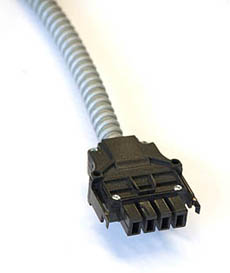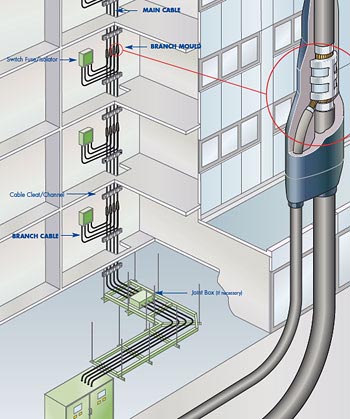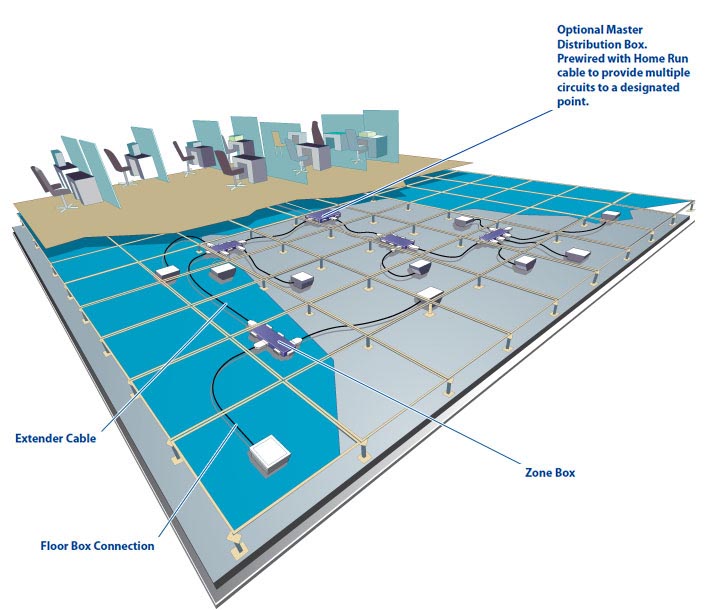|
 Modular Wiring Systems have been in existence for some 25 years, but many specifiers, developers and contractors are not only reticent to use them due to lack of understanding, but incredibly some still don’t even know what they are. Incorrect assumptions abound, from the perceived high cost and lack of flexibility and control, through to quality issues. Modular Wiring Systems have been in existence for some 25 years, but many specifiers, developers and contractors are not only reticent to use them due to lack of understanding, but incredibly some still don’t even know what they are. Incorrect assumptions abound, from the perceived high cost and lack of flexibility and control, through to quality issues.
Modular Wiring Systems has been in the business for 16 years and is the leader in its field. Here we take the opportunity to explain what a modular wiring system is, dispel any myths and lay bare the key benefits of these pre fabricated systems.
What is a modular wiring system?
Let’s start from the very beginning. A modular wiring system is a rapid and easily installed modular distribution system prefabricated off-site; the system is essentially the circuit lines of a traditional scheme. It allows for a complete installation, from the pre wired plug in distribution board (all wired internally) to the furthest point of a circuit, by simply connecting the system components together, without any hardwired connections. Conduits containing all the cables of the system have a plug mechanism on the end which simply slots into the board. The system is normally colour coded, so it couldn’t be simpler to work out what plugs in to where.
The systems are available as radial and ring main up to 32amps.
Where can I use a modular wiring system?
Modular wiring systems can be used in very wide range of environments, including Commercial, Healthcare, Educational, Leisure, Residential and Retail. Typical applications include Lighting (Fluorescent, Decorative, High and Low Bay Lighting Control), Power Partitioning Dry-lined walls, Fan Coils, VAVs Access floors, Data Lighting Control and BMS Structured Wiring.
Will a modular wiring system take up more space?
Unexpectedly, modular wiring systems actually keep ceiling voids to a minimum. Home run cables containing nine circuits are no greater than 30mm in diameter, extender cables are 13mm and MDBs are just 80mm deep. All fit neatly into the lighting zone.
How do I get a modular wiring system made?
Most manufacturers of modular wiring systems will be able to offer you a full service, including design, manufacture and supply, although there will be differing levels of that service availability and quality.
At Modular Wiring Systems we provide total design support, including Auto-Cad layout designs, voltage drop calculations, record drawings etc. However, we can also work to drawings supplied. It’s up to you at what level you want to get the manufacturer involved.
Why choose modular wiring systems when fixed installations work perfectly well?
Traditional fixed installations remain the norm, but once people try a modular wiring system they rarely go back! That’s because in comparison to a modular wiring solution, fixed installations are labour intensive, offer little in flexibility and are more costly.
 How quickly can a modular system be installed? How quickly can a modular system be installed?
One of the key benefits of modular wiring systems is the speed of installation. We’ve carried out numerous comparative studies and believe an installation can be achieved up to 80% quicker than traditional methods and utilising less labour. This allows install programmes to be accelerated.
How much labour do I need to fit a system?
As most of the work to create the distribution system is done off site, a modular wiring system minimises on site labour requirements by up to 70%. That represents an incredible cost saving, even taking into account the extra cost of the system pre fabrication. Furthermore, much of the skill level required for a traditional installation has been removed, further reducing your costs.
And, of course, you benefit by having fewer people on site with all the safety implications that brings with it.
How does the quality of such systems fair in relation to fixed installations?
A concern often voiced by contractors is the quality of a pre fabricated system as it is out of their control, unlike a fixed installation. However, select a reputable manufacturer and the system you receive will be of a far superior quality than you could hope to achieve on site. This is because the complete system is manufactured off site in a factory controlled environment, thus eliminating the potential risks of on site conditions.
Another useful by product of this level of quality control is that testing and fault finding is minimised on site – it’s already been done in the factory.
A modular system should give you 25 years of trouble free life.
 Are all modular wiring systems similar? Are all modular wiring systems similar?
Whilst most modular wiring systems follow the same basic principles, there are many differences in the equipment used and varying levels of quality. These are the key items to look out for:- Check the cables used are to the relevant British and International standards such as BSI, CSA, UL – and ask to see the certificates.
- Look at the connections used as this is normally a good sign of the system quality. We’ve seen some plugs that look like they’ve been cobbled together in someone’s garage – they’re not rugged enough and are likely to cause problems during and after installation.
- Check if the manufacturer buys in the connector components or manufactures them in house as this will have a bearing over quality and availability – you don’t want the system delayed because the components are on a slow boat from China. You’d be surprised how many times this happens.
- Does the supplier have in house manufacturing or do they simply assemble on site? If it’s the latter they won’t be able to produce any one off specials. For the majority of installations this won’t be an issue, but what happens when there is? It’s unlikely another manufacturer is going to make a special for you if he’s not working on that project.
- Check the conduit complies with the relevant standards when run in a wall void.
- In addition to radial sub circuit distribution systems, take a look at the company’s ring main system. Many manufacturers are actually unable to supply ring main systems and some of those that do are of dubious quality, incapable of incorporating all six cables into one conduit, spreading them across two instead. Furthermore, many are not covered properly and provide insufficient protection, making them potentially dangerous.
How flexible are modular wiring systems?
As we all know, no build ever goes perfectly to plan and there is always a need for on site adjustments. Many contractors make the assumption that as a modular wiring system is pre fabricated off site it will have no, or limited, flexibility. But in fact the reverse is true. As modular systems feature easy to use plugs and sockets instead of hard wiring, it’s actually easy to make changes to the system by simply unplugging the connections without much skill required. Of course, without the hard wiring to undo and re do, it’s also much quicker.And let’s not forget the system is just as simple to reconfigure at a later date, maybe when the building usage is altered, without the disruption and inconvenience of hard wiring. This is especially useful in retail, where displays and shop layouts change on a regular basis.
What logistics are involved in getting the system to site and on site storage?
When you’re dealing with multi floor fit outs, getting the logistics right is a make or break situation to the success of the build. Delivering equipment to site, storage on site and allocation to the floor at the right time has to be fine tuned. Clearly with a system pre fabricated off site, you no longer have to store all the individual items you would normally require in such bulk, such as conduit, trunking, cabling etc., so instantly you have dramatically reduced on-site storage.
You also reduce on site wastage, as there is no requirement for cutting and fabrication – good for the environment, good for health and safety, good for waste management and even better for the bottom line!
Instead, the system is delivered to site ready made, but even then you don’t have to worry about storage as a good manufacturer will be capable of responding to the contractors request for materials on a floor by floor basis and will deliver direct to the working area. At Modular Wiring Systems we employ a philosophy of ‘Just in Time’ – we deliver just in time for the customer’s needs, but we design and manufacture in advance.
 What levels of maintenance are required? What levels of maintenance are required?
As no screw connectionsare employed within the system, on the basis that connections are generally where faults occur, modular wiring systems really are maintenance free. It’s a fit and forget situation.
What should I look for when choosing a modular wiring company?
If you’ve liked what you’ve read so far and are considering going down the modular wiring systems route for a project, the next step is to select the system and the manufacturer. I’ve already given you some key indicators of what to look for in a system, but the supplier of that system is just as important. You want someone reliable, experienced and able to meet your requirements. If you select the right manufacturer, he may just exceed those requirements.
As with any supplier, look at how long they have been established and what experience they have, not just in modular systems, but in your specific market place; a hospital is a very different proposition to an office block, for example.
Ask to see some previous samples of their CAD work and check the clarity of the designs to see how easy they are to follow. Confirm right from the start if the drawings are included in the price as many companies charge for these separately. At Modular Wiring Systems we have two dedicated CAD personnel who, for all intents and purposes, act as another engineer – so you get real value for money.
The other item you need to check for clarity is the instruction kit. Again, ask to see a sample of the instructions you will get with the system – they must be easy to follow, as you are offsetting the cost of the system by using less labour and fewer skilled electricians.
Confirm the lines of communication between you and supplier. Will you be allocated a specific member of staff or will you deal with different people throughout the life cycle of the project? Different companies work in different ways, but ideally you want a single point of contact throughout the project, to help take the pressure of the Project Engineer.
Lastly, and especially important on larger projects and those that have a tight programme, check to see exactly what capacity they have. If the company is small with limited manufacturing capability you may find yourself waiting for the system to be delivered to site and all the benefits – namely speed of installation and reduced labour – being eroded by the delivery delay. A good company will have the capacity to provide a fast turnaround.
With increased pressure on contractors to reduce time and labour costs, modular wiring systems provide a simple and effective way to design and fit sub circuit distribution systems, whilst actually increasing quality and flexibility of the install and the final system. So one last one question that only you can answer: why aren’t you using them?

For more information, please contact Modular Wiring Systems on 01246 858000 or
This e-mail address is being protected from spambots. You need JavaScript enabled to view it
|